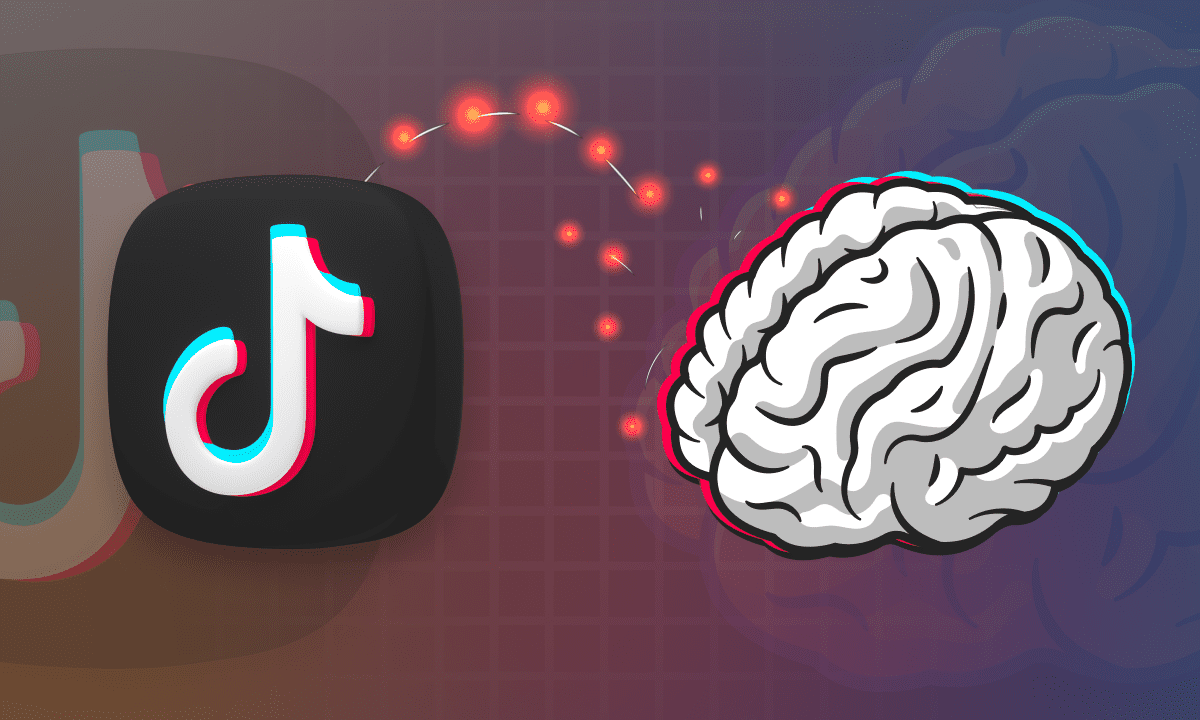
The Psychology of TikTok Brain
Table of Contents
Today’s kids are more distracted than ever and ‘TikTok brain’ is partly to blame. The endless stream of short, fast-paced videos that offer instant – and constant – gratification is leading to shorter attention spans and other negative issues.
This article looks at whether TikTok brain is real and explores how the platform can affect the mental health of young users.
What is ‘TikTok brain’?
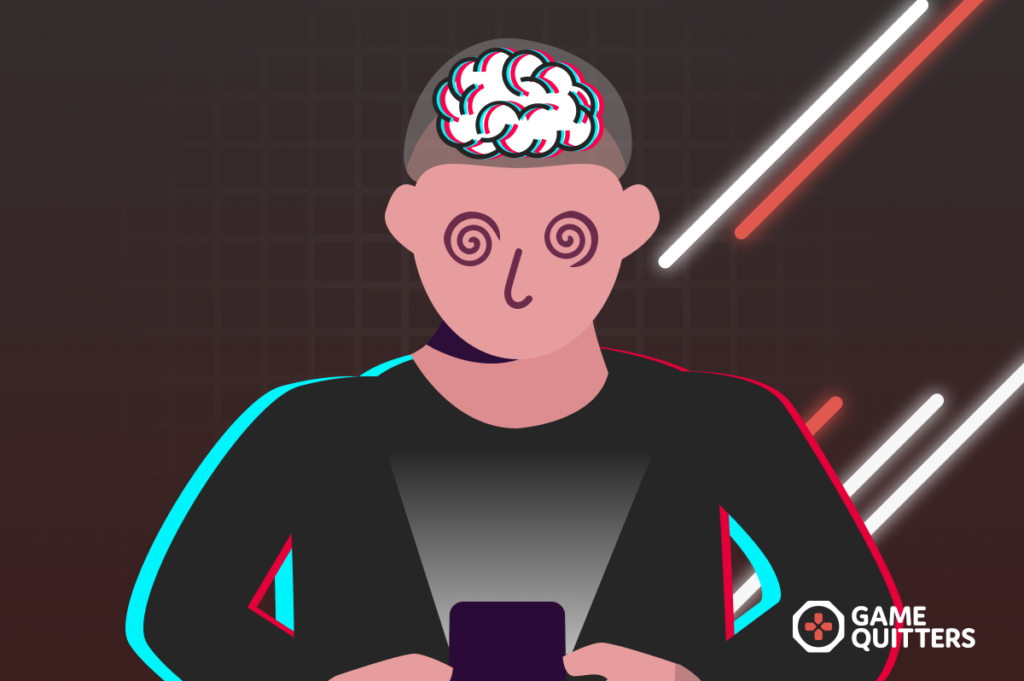
The term ‘TikTok brain’ is used to describe some of negative aspects associated with the platform including lower attention spans and increased anxiety and depression. Too much time spent on TikTok can become problematic and lead to addiction.
The social media app has made short-form videos increasingly popular with the optimal video length just 21 to 34 seconds. 1 1. https://sociality.io/blog/tiktok-video-length/#1-average-tiktok-video-length × As a result, kids are struggling to focus on a wide range of activities from reading a book or completing a homework assignment to watching a full-length movie.
So, how does ‘TikTok brain’ develop? It is linked to the psychology behind TikTok and its algorithm.
Is TikTok bad for your brain?
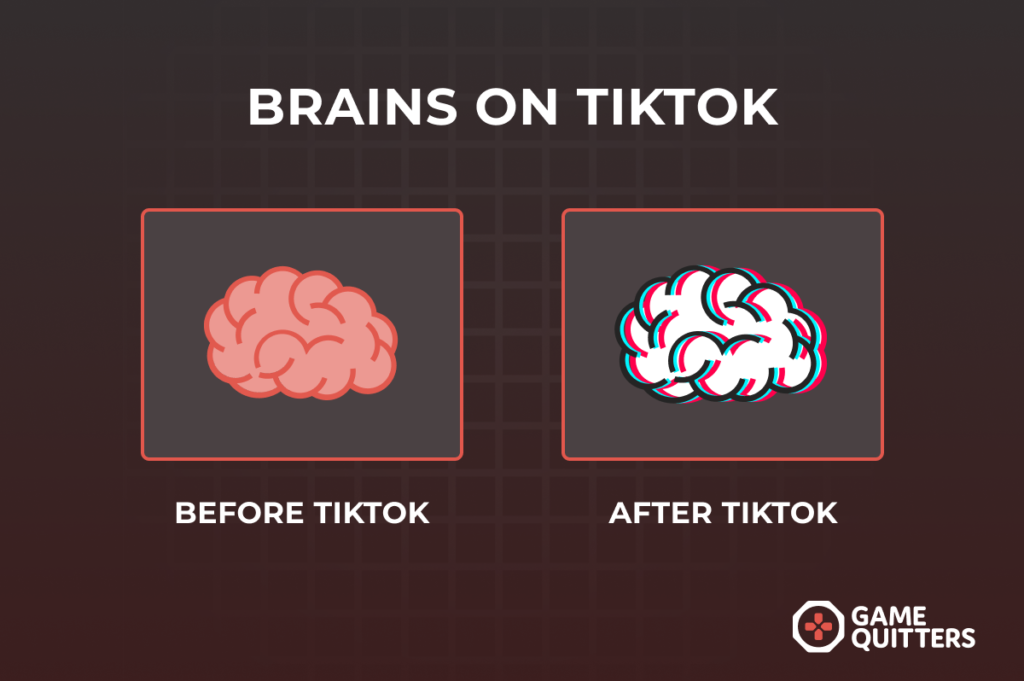
The TikTok algorithm is interest based, so it shows content that reflects what viewers have previously watched – whether they engaged with it or not. Within a short space of time, the algorithm can detect their hobbies and interests, sense of humor, fashion style, music tastes, sexual orientation, political views and much more. This personalized viewing experience sounds harmless but it can push users down a rabbit hole that can reinforce negative thoughts and behaviors, and bombard them with content that is not always healthy.
Every time users watch a video on TikTok, dopamine is released in their brains in a way that mimics the effects of drugs and there is not much that can compete with this type of stimulation. Young people are more predisposed to addiction because their brain development is not complete until they reach 25 to 30 years old.
So, is TikTok bad for your brain? A study investigating Douyin, the Chinese equivalent of TikTok found that personalized videos suggested by the algorithm stimulated the brain’s reward centers more than random videos watched by new users. It also found that brain scans of Chinese college students who watched personalized videos had highly activated areas involved in addiction and some users struggled to control their viewing habits.
How TikTok affects mental health
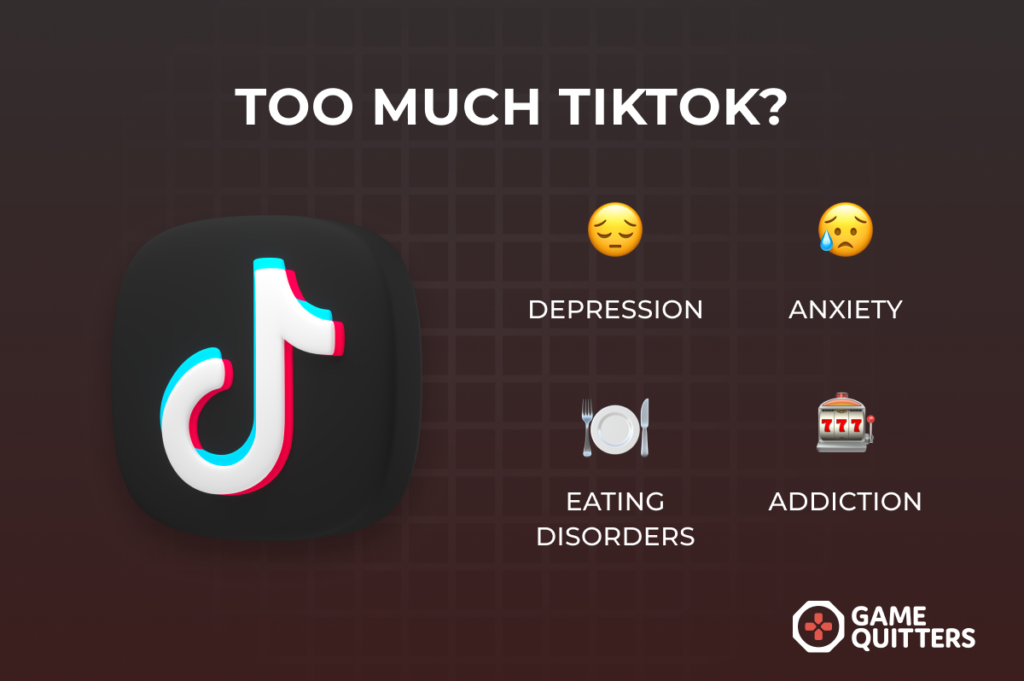
For many teens, TikTok is a fun way to stay entertained, informed and connected. However, for others sharing and watching videos for hours on end can be harmful to their emotional well-being. Here are some of the ways that TikTok can affect young people’s mental health:
Increased stress, anxiety and depression
A study of high school students in China who regularly use TikTok found that those with addictive tendencies towards TikTok had higher rates of anxiety, stress and depression 2 2. https://www.psypost.org/2022/01/teens-who-are-addicted-to-tiktok-experience-worse-depression-and-anxiety-and-in-turn-reduced-working-memory-capacity-62416 × than those who use the app less frequently.
Can encourage eating disorders
Some impressionable TikTok users are watching and being influenced by content that normalizes eating disorders like anorexia nervosa and bulimia nervosa, Videos such as “What I eat in a day – under 1,200 calories” encourage an unhealthy relationship with food and portray eating disorders as a lifestyle choice, rather than dangerous mental illnesses.
Higher risk of suicide
Research has found that 13-year-old teenage girls who used social media for at least two to three hours daily at the start of a 10-year study, and then greatly increased their usage over time, were at a higher risk of suicide as adults. 3 3. https://www.newswise.com/articles/10-year-study-shows-elevated-suicide-risk-from-excess-social-media-time-for-teen-girls × Whereas, for boys, social media use had no obvious effect on their suicidality risk.
Problematic use and addiction
The impact of TikTok dopamine on the brain can lead to the problematic use and, in extreme cases, TikTok addiction. This can have a range of negative impacts including disrupted sleep, neglected hygiene, poor school performance, family conflict and social isolation.
How TikTok is supporting mental health
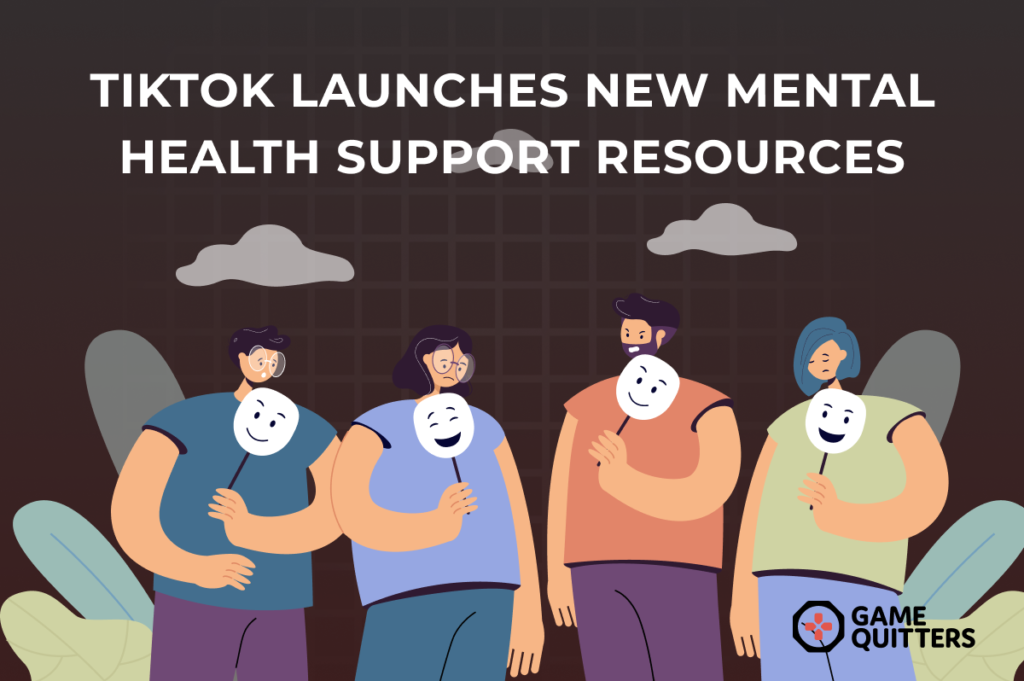
As an organization, TikTok is taking steps to promote the importance of positive mental health and balance to users.
Well-being Guide for users
TikTok has produced a Well-being Guide 4 4. https://www.tiktok.com/safety/en/well-being-guide/ × where users are encouraged to share their mental health stories, tips and recovery journeys. It includes a reminder of the platform’s safety and privacy controls which can help minimize negative in-app experiences:
- Account settings – Your child can restrict who can follow and engage with them by setting their account to private. For users under 16, the account is set to private by default.
- Comments – This feature allows users to decide who can comment on their videos – no one, friends or everyone (the latter option is for users aged 16+ only). It is also possible to switch off comments completely.
- Not interested – If you don’t want your child to see certain types of video on the For You page, simply press on the video and select “Not interested”.
- Report – It is possible to report any concerning content to TikTok.
It can also be helpful for parents to understand more of the slang on TikTok that users may use.
Weekly digital well-being prompts
TikTok has also announced the introduction of weekly digital well-being prompts 5 5. https://newsroom.tiktok.com/en-us/investing-in-our-communitys-digital-well-being × for younger users. If anyone aged 13-17 uses the app for more than 100 minutes a day, they will receive a screen time limit tool reminder next time they open the app.
How to reset TikTok brain
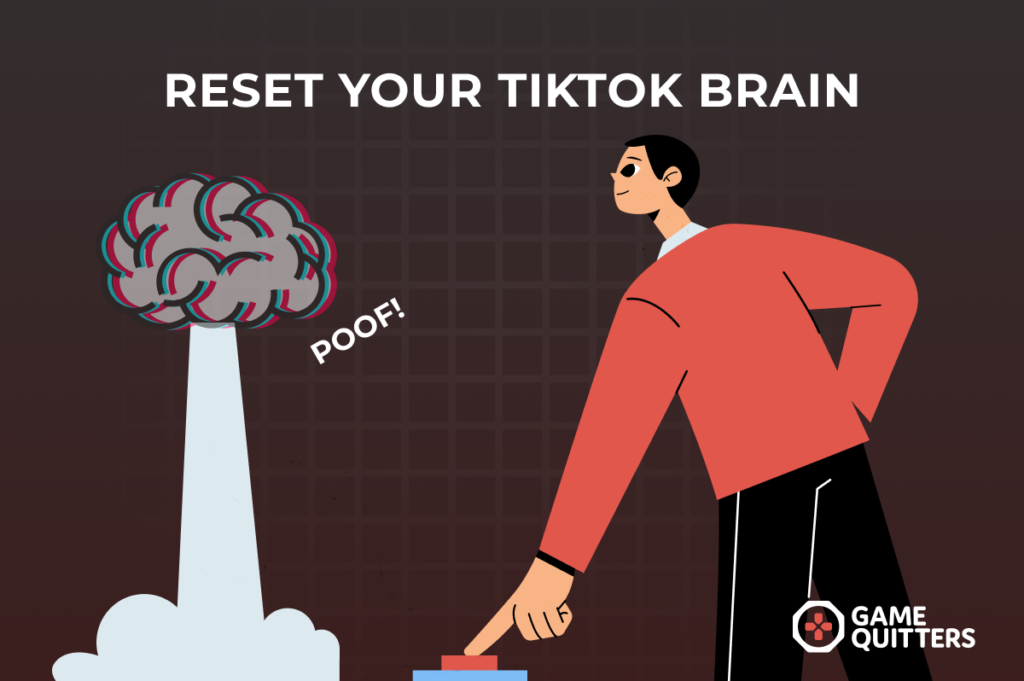
If your child is constantly scrolling through TikTok and other sources of cheap dopamine and it is becoming a problem, you may want to help them reduce their reliance on it. Even though they will probably be reluctant to cut down initially, having regular breaks will strengthen the connections in their brain and make it easier to stop again next time.
Here are five ways to manage their screen time and reset their brain:
1. Customize the TikTok app
You can help your child control their TikTok use by setting up Family Pairing – a tool that allows parents and teens to customize the app for a healthier experience. You can use it to:
- Set a daily screen time limits based on guidelines of what is appropriate.
- Use restricted mode to limit your child’s access to inappropriate content.
- Decide who can send direct messages to your child or turn off direct messaging altogether.
2. Use the screen time dashboard
TikTok has a screen time dashboard to help your child manage and reduce their video consumption. It shows how much time they have spent on TikTok – with a breakdown of daytime and night-time usage – and the number of times they have opened the app each day.
3. Restrict access to desktop or laptop only
If your child is still unable to control their TikTok use despite the above measures, you may need to go one step further. Rather than depriving your child of TikTok altogether, you could consider deleting the TikTok app on their smartphone. If they can only access it in a on a desktop or laptop, they will be more mindful of the time they spend scrolling.
4. Have TikTok-free zones
Agree on places around the home where TikTok is not allowed such as at the dinner table and in your child’s bedroom at night. Good sleep is essential for the brain to work optimally and is important for focus and attention.
5. Suggest screen-free activities
Engaging in other hobbies, interests and activities – playing sport, going to the park, meeting friends, being creative – can help reset your child’s brain. Here is a list of the 50 best screen-free activities by age for inspiration.
Need help for social media problems?
If your child is struggling to control their TikTok use and it’s having a negative impact on their mental health and well-being, we can help.
Our coaching program is designed to help young people and their families have a healthier relationship with technology and overcome social media addiction.
Contact us now to book your gameplan strategy call.
Footnotes
- https://sociality.io/blog/tiktok-video-length/#1-average-tiktok-video-length ↩
- https://www.psypost.org/2022/01/teens-who-are-addicted-to-tiktok-experience-worse-depression-and-anxiety-and-in-turn-reduced-working-memory-capacity-62416 ↩
- https://www.newswise.com/articles/10-year-study-shows-elevated-suicide-risk-from-excess-social-media-time-for-teen-girls ↩
- https://www.tiktok.com/safety/en/well-being-guide/ ↩
- https://newsroom.tiktok.com/en-us/investing-in-our-communitys-digital-well-being ↩
